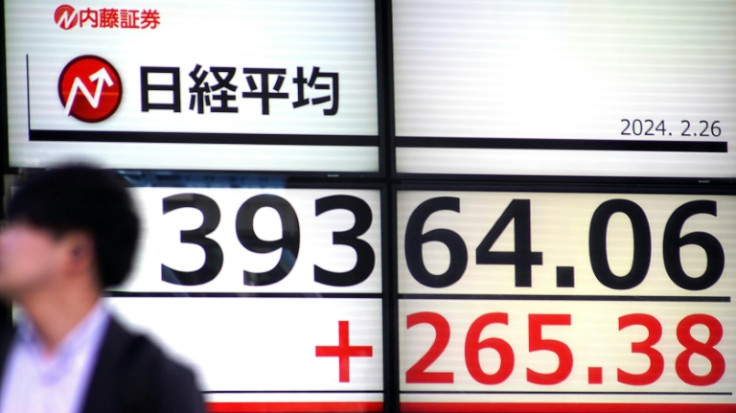
Asian markets were mostly lower Monday, although Tokyo's key Nikkei index closed at a fresh all-time high after two of the three main US indices hit records.
Investors are turning to profit-taking as last week's mega market rally -- fuelled by stellar results from US technology titan Nvidia -- loses steam, analysts say.
On Wall Street Friday, the Dow and the S&P ended higher than ever but the tech-heavy Nasdaq index slipped, following a three-percent surge a day earlier.
The "Nvidia advance moderated while other big tech share prices eased following a decent AI-driven run of late," said Rodrigo Catril, senior FX strategist at National Australia Bank.
Tokyo's Nikkei index closed 0.3 percent higher, pushing further past the December 1989 record it smashed on Friday.
But Chinese shares faltered, with Hong Kong and Shanghai both down 0.4 percent.
The losses came despite Beijing saying it wants to boost sales of cars, appliances and other consumer products, in "piecemeal incentives to stimulate the economy", Catril said.
In China, "the property market's woes have worsened, and manufacturers continue to sit on the sidelines," Harry Murphy Cruise from Moody's Analytics told AFP.
"To make matters worse, investors have pulled out of equity markets, prompting a sleuth of interventions in recent weeks," he said.
Those measures have stabilised the market, with Chinese stocks rebounding from early February lows.
But underlying weakness means "investors are crying out for larger economic supports to be rolled out", Cruise said.
Market players are now watching to see if extra spending and an ambitious growth target will be announced in March to help the economy gain momentum through the year, he said.
In afternoon trade, Singapore dropped 1.0 percent and Seoul fell 0.6 percent. Bangkok, Jakarta and Wellington were lower, but Sydney and Taipei inched up.
Oil prices were down, extending losses on Friday as the G7 countries pledged new sanctions on Russia two years after its invasion of Ukraine.
"Lack of demand (for crude oil) remains a concern while new US and EU Russia sanctions added to the uncertainty," Catril said.
This week brings a raft of major indicators including January CPI for Australia and Japan, and so-called "Super Friday", when key inflation and manufacturing data will be released by the United States and China.
In particular, the US Personal Consumption Expenditure (PCE) price index will be closely watched because it may affect the Federal Reserve's interest rate decisions.
"All eyes are on this week's PCE release," Cruise said.
"For Asian markets, a higher print -- combined with the Fed's fear of easing too early -- could see rate cuts delayed... putting downward pressure on the region's currencies."
Tokyo - Nikkei 225: UP 0.3 percent at 39,233.71 (close)
Hong Kong - Hang Seng Index: DOWN 0.4 percent at 16,664.52
Shanghai - Composite: DOWN 0.4 percent at 2,991.57
Dollar/yen: DOWN at 150.40 yen from 150.53 yen on Friday
Pound/dollar: DOWN at $1.2669 from $1.2672
Euro/dollar: DOWN at $1.0822 from $1.0824
Euro/pound: UP at 85.42 pence from 85.39 pence
Brent North Sea Crude: DOWN 0.3 percent at $81.28 per barrel
West Texas Intermediate: DOWN 0.5 percent at $76.10 per barrel
New York - Dow: UP 0.2 percent at 39,131.53 points (close)
London - FTSE 100: UP 0.3 percent at 7,706.28 (close)




